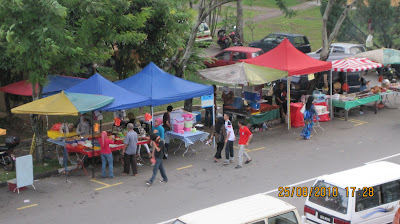Ramadan bazaars sprout up like mushrooms during the fasting month. They seem to get bigger and busier with each passing year. It will be no different this year.
Ipoh, the capital city of Perak, is gearing itself to be the best state in Malaysia in terms of providing Ramadan bazaars to Muslims in the city. Apparently, the Ipoh City Council will provide "five-star services" to visitors and traders at some Ramadan bazaars in the city in a project known as the Ibu Bazar Ramadan or Mother of all Ramadan Bazaars.
Five areas -- Perak Stadium, Medan Gopeng, Taman Perpaduan, Taman Tasek Indera and Taman Desa Aman -- will launch the experiment today, the first day of fasting.
There will be a special marquee for donation seekers and tithe collectors, in addition to the colourful spread of local favourites in stalls dotting the premises of these bazaars. Prayer spaces for women and men complete with ablution facilities are also available. In other words, the Council wants to make these Ramadan food centres in Ipoh the most talked about in Malaysia.
I have no quarrel with the Council's plan. Indeed, Ramadan bazaars have become a major feature of the fasting month in all states throughout Malaysia that draw visitors to local events specially set up for the holy month and give us the opportunity to explain our culture.
However, Muslims need to remind each other that the month of Ramadan is more about renewing oneself spiritually to face the challenges of the future on Earth and preparing for life after death than making plans to visit the various bazaars.
Many appear to focus on preparation to greet the month of Syawal including making cakes and cookies, cleaning the house, buying new curtains and furniture as well as shopping for new clothes for the whole family.
We tend to overlook the significance of Ramadan which offers us extraordinary possibilities to engage in activities -- fasting, paying zakat and night prayers, among others -- that will enhance our connection with Allah SWT. Are we prepared to make Ramadan this year better than last year's? We must try hard to achieve that goal,
Ramadan Kareem to Muslim readers of this blog!
Ipoh, the capital city of Perak, is gearing itself to be the best state in Malaysia in terms of providing Ramadan bazaars to Muslims in the city. Apparently, the Ipoh City Council will provide "five-star services" to visitors and traders at some Ramadan bazaars in the city in a project known as the Ibu Bazar Ramadan or Mother of all Ramadan Bazaars.
Five areas -- Perak Stadium, Medan Gopeng, Taman Perpaduan, Taman Tasek Indera and Taman Desa Aman -- will launch the experiment today, the first day of fasting.
There will be a special marquee for donation seekers and tithe collectors, in addition to the colourful spread of local favourites in stalls dotting the premises of these bazaars. Prayer spaces for women and men complete with ablution facilities are also available. In other words, the Council wants to make these Ramadan food centres in Ipoh the most talked about in Malaysia.
I have no quarrel with the Council's plan. Indeed, Ramadan bazaars have become a major feature of the fasting month in all states throughout Malaysia that draw visitors to local events specially set up for the holy month and give us the opportunity to explain our culture.
However, Muslims need to remind each other that the month of Ramadan is more about renewing oneself spiritually to face the challenges of the future on Earth and preparing for life after death than making plans to visit the various bazaars.
Many appear to focus on preparation to greet the month of Syawal including making cakes and cookies, cleaning the house, buying new curtains and furniture as well as shopping for new clothes for the whole family.
We tend to overlook the significance of Ramadan which offers us extraordinary possibilities to engage in activities -- fasting, paying zakat and night prayers, among others -- that will enhance our connection with Allah SWT. Are we prepared to make Ramadan this year better than last year's? We must try hard to achieve that goal,
Ramadan Kareem to Muslim readers of this blog!
 |
| Bazaars appear suddenly and in large numbers during Ramadan in Malaysia |
Comments